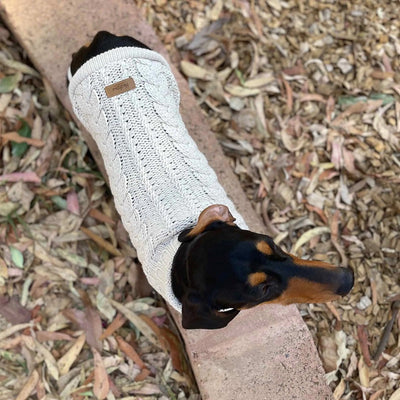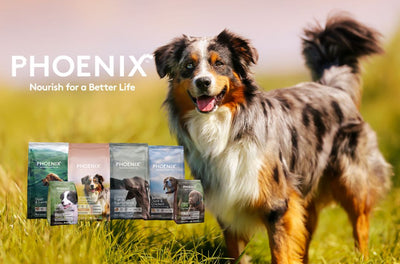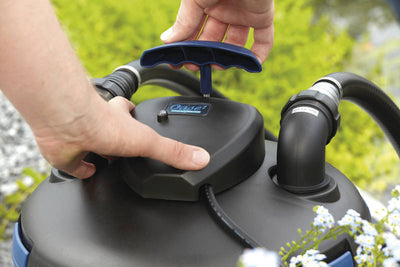 Is your furry friend in need of shedding a few pounds? Choosing the right dog food can make a huge difference in their weight loss journey. But with all the options available, how do you know which one is the best?
Is your furry friend in need of shedding a few pounds? Choosing the right dog food can make a huge difference in their weight loss journey. But with all the options available, how do you know which one is the best?
In this ultimate guide, we'll walk you through everything you need to know about choosing the best weight loss dog food for your four-legged companion. From understanding the nutrition labels to deciphering the ingredients, we'll break down the key factors to consider when selecting a dog food that promotes healthy weight loss.
Whether your dog needs to slim down for health reasons or you simply want to prevent weight gain, this guide has got you covered. We'll provide practical tips and recommendations to ensure your dog reaches and maintains a healthy weight in a safe and sustainable way.
Remember, when it comes to weight loss dog food, there is no one-size-fits-all solution. Every dog has unique nutritional needs, and finding the right balance is crucial. So, let's dive in and discover the best weight loss dog food for your furry friend.
Essential nutrients for weight loss in dogs
When it comes to weight loss, providing your dog with the right balance of essential nutrients is crucial. A well-rounded diet that includes the following nutrients can help support healthy weight loss:
1. Protein: Protein is essential for muscle maintenance and repair. It also helps your dog feel full and satisfied, reducing the urge to overeat. Look for weight loss dog foods that have high-quality sources of protein, such as chicken, fish, or turkey.
2. Fiber: Fiber is key to promoting feelings of fullness and regulating digestion. It can also help prevent constipation and maintain bowel regularity. Look for weight loss dog foods that contain sources of soluble and insoluble fiber, such as brown rice, sweet potatoes, or pumpkin.
3. Healthy Fats: While it may seem counterintuitive, healthy fats are an important part of a weight loss diet for dogs. They provide essential fatty acids and help promote a healthy coat and skin. Look for weight loss dog foods that contain sources of omega-3 fatty acids, such as fish oil or flaxseed.
4. Vitamins and Minerals: A balanced diet should also include a variety of vitamins and minerals to support overall health. Look for weight loss dog foods that are fortified with essential nutrients like vitamin E, vitamin C, and zinc.
By ensuring your dog's weight loss dog food contains these essential nutrients, you can provide them with a well-rounded diet that supports their weight loss goals. Remember to consult with your veterinarian to determine the specific nutritional needs of your furry friend.
Understanding the importance of a healthy diet for dogs
 Just like humans, dogs require a healthy diet to maintain optimal health and well-being. A balanced diet not only provides the necessary nutrients for growth and development but also plays a vital role in weight management.
Just like humans, dogs require a healthy diet to maintain optimal health and well-being. A balanced diet not only provides the necessary nutrients for growth and development but also plays a vital role in weight management.
Obesity in dogs can lead to a variety of health issues, including diabetes, joint problems, and heart disease. It's important to understand that weight loss should be approached with caution and under the guidance of a veterinarian.
A healthy diet can help prevent weight gain and promote weight loss in dogs. It should consist of high-quality ingredients that are easily digestible and provide the necessary nutrients for your dog's overall health. Additionally, portion control is crucial to ensure your dog is not consuming excessive calories.
Common causes of weight gain in dogs
Weight gain in dogs can be attributed to a variety of factors, including:
1. Overfeeding: One of the primary causes of weight gain in dogs is overfeeding. This can occur when owners provide excessive amounts of food or when dogs are given too many treats throughout the day. It's important to follow the recommended feeding guidelines provided by the dog food manufacturer and limit the number of treats your dog receives.
2. Lack of Exercise: Just like humans, dogs need regular exercise to maintain a healthy weight. A sedentary lifestyle can lead to weight gain and obesity. Make sure to provide your dog with daily exercise, such as walks, playtime, or interactive toys.
3. Medical Conditions: Certain medical conditions can cause weight gain in dogs. Hypothyroidism, Cushing's disease, and certain medications can all contribute to weight gain. If you suspect a medical condition is causing your dog's weight gain, consult with your veterinarian for proper diagnosis and treatment.
4. Breed Predisposition: Some dog breeds are more prone to weight gain than others. Breeds such as Labrador Retrievers, Beagles, and Bulldogs have a tendency to gain weight more easily. It's important to be aware of your dog's breed predisposition and take proactive measures to prevent weight gain.
By understanding the common causes of weight gain in dogs, you can take the necessary steps to prevent it and promote healthy weight loss if needed. A combination of a balanced diet and regular exercise is key to maintaining a healthy weight for your furry friend.
The role of diet in weight management for dogs
Diet plays a crucial role in weight management for dogs. Providing your dog with a diet that is specifically formulated for weight loss can help them shed those extra pounds in a safe and sustainable way. Here's how diet can impact weight management in dogs:
1. Caloric Intake: The number of calories your dog consumes plays a significant role in weight management. To achieve weight loss, you need to create a calorie deficit by feeding your dog fewer calories than they burn. Weight loss dog foods are formulated to be lower in calories while still providing the necessary nutrients.
2. Portion Control: Along with choosing the right dog food, portion control is essential for weight management. Measuring your dog's food and feeding them the recommended amount can help prevent overfeeding. It's important to adjust the portion size based on your dog's activity level, age, and overall health.
3. Feeding Frequency: The frequency of meals can also impact weight management. Instead of leaving food out all day, consider feeding your dog two to three smaller meals throughout the day. This can help prevent overeating and promote better digestion.
4. Food Quality: The quality of the ingredients in your dog's food can make a significant difference in their weight management journey. Look for weight loss dog foods that are made with high-quality, whole food ingredients and free from fillers or artificial additives.
By focusing on these key aspects of diet, you can effectively manage your dog's weight and help them achieve their weight loss goals. Remember, it's important to monitor their progress and consult with your veterinarian for guidance and support.
Key factors to consider when choosing weight loss dog food
When it comes to choosing weight loss dog food, there are several key factors to consider. These factors can help you determine which dog food is best suited for your furry friend's weight loss journey. Here are some important considerations:
1. Nutritional Content: Look for weight loss dog foods that are specifically formulated to provide balanced nutrition while reducing calories. The food should contain high-quality sources of protein, fiber, and healthy fats to support weight loss.
2. Ingredients: Pay attention to the ingredients list on the dog food label. Avoid foods that contain fillers, artificial additives, or excessive amounts of carbohydrates. Instead, opt for foods that have whole food ingredients and limited additives.
3. Caloric Density: Different weight loss dog foods have varying caloric densities. Some foods may have a higher volume with fewer calories, while others may have a lower volume with more calories. Consider your dog's preferences and feeding habits when choosing a food with the appropriate caloric density.
4. Special Dietary Needs: If your dog has any special dietary needs or allergies, make sure to choose a weight loss dog food that accommodates those requirements. Consult with our knowledgeable staff for guidance on selecting the right food for your dog's specific needs.
By considering these key factors, you can make an informed decision when choosing weight loss dog food for your furry friend. Remember, it's important to consult with your veterinarian to ensure the chosen food aligns with your dog's specific needs.
Top recommended weight loss foods for your dog that get results
With so many weight loss dog food options on the market, it can be overwhelming to choose the right one for your dog. To simplify the process, here are some top recommended weight loss dog foods that have received positive reviews and are known for their quality and effectiveness:
1. Ivory Coat Reduced Fat Turkey for Senior Dogs: As dogs approach their mature years they become less active, so carrying extra weight is not good for their joints. The Ivory Coat Turkey Reduced Fat/Senior Adult Dry Dog Food is specifically made for older dogs with its low-fat, protein-rich and grain-free formula that helps to keep their muscles strong. Flavourful without compromising on health benefits, this dog food is loaded with superfoods for increased antioxidant intake, and enriched with a natural prebiotic for normal digestive function.
mature years they become less active, so carrying extra weight is not good for their joints. The Ivory Coat Turkey Reduced Fat/Senior Adult Dry Dog Food is specifically made for older dogs with its low-fat, protein-rich and grain-free formula that helps to keep their muscles strong. Flavourful without compromising on health benefits, this dog food is loaded with superfoods for increased antioxidant intake, and enriched with a natural prebiotic for normal digestive function.
2. Hill's Science Diet Perfect Weight: Developed by veterinarians, this weight loss dog food is made with natural ingredients and provides balanced nutrition. It is designed to help dogs achieve and maintain a healthy weight.
3. Royal Canin Light Weight Care Dog Food: Hunger-satisfying nutrition with a rich taste, formulated to help keep him fit. This formula is high in fibre and essential oils to provide DHA for their anti-inflammatory qualities to help support your dog’s joints.
Remember, these are just a few examples of weight loss dog foods available on the market. It's important to consider your dog's specific needs and consult with your veterinarian to determine the best option for them.
How to transition your dog to a new weight loss dog food
When transitioning your dog to a new weight loss dog food, it's important to do so gradually to prevent any digestive upset. Follow these steps to ensure a smooth transition:
1. Start Slow: Begin by mixing a small amount of the new weight loss dog food with your dog's current food. Gradually increase the amount of the new food while decreasing the amount of the old food over the course of 7-10 days.
2. Monitor Your Dog: During the transition period, keep a close eye on your dog's digestion and overall well-being. If you notice any signs of digestive upset, such as diarrhea or vomiting, slow down the transition process or consult with your veterinarian.
3. Adjust Portion Sizes: As you transition your dog to the new weight loss dog food, it's important to adjust the portion sizes accordingly. Follow the feeding guidelines provided by the dog food manufacturer and monitor your dog's weight loss progress.
4. Stay Consistent: Once your dog has fully transitioned to the new weight loss dog food, it's important to stick with it. Consistency is key when it comes to achieving and maintaining a healthy weight for your furry friend.
By following these steps, you can ensure a successful transition to a new weight loss dog food and support your dog's weight loss journey.
Tips for monitoring your dog's weight loss progress
Monitoring your dog's weight loss progress is crucial to ensure they are on the right track. Here are some tips to help you track their progress effectively:
1. Weigh Your Dog: Regularly weigh your dog using a pet scale or by visiting our store. We have accurate scales that allow your furry friend to stand on for their weigh ins. We recommend a weekly weigh in to gain an accurate measurement of their weight loss progress.
2. Track Body Condition: In addition to weighing your dog, assess their body condition regularly. Look for visible signs of weight loss, such as a more defined waistline or a reduction in body fat.
3. Keep a Food Diary: Keep a record of the amount of food your dog consumes each day. This will help you track their caloric intake and make adjustments if necessary.
4. Exercise Routine: Monitor your dog's exercise routine and ensure they are getting an appropriate amount of physical activity. Regular exercise is essential for weight loss and overall well-being.
5. Consult with Your Veterinarian: Regularly consult with your veterinarian to discuss your dog's weight loss progress and make any necessary adjustments to their diet or exercise routine.
By tracking your dog's weight loss progress, you can make informed decisions and ensure they are on the right path to reaching and maintaining a healthy weight.
Finding the best weight loss dog food for your furry friend
Choosing the best weight loss dog food for your furry friend is a crucial step in their weight loss journey. By understanding the essential nutrients for weight loss, the importance of a healthy diet, and the common causes of weight gain in dogs, you can make an informed decision.
Consider key factors such as nutritional content, ingredients, caloric density, special dietary needs, and brand reputation when selecting weight loss dog food. Consult with your veterinarian to ensure the chosen food aligns with your dog's specific needs.
Transition your dog to a new weight loss dog food gradually and monitor their progress closely. Keep track of their weight, body condition, food intake, and exercise routine. Regularly consult with your veterinarian for guidance and support.
Remember, every dog is unique, and finding the best weight loss dog food may require some trial and error. With patience, dedication, and the right guidance, you can help your furry friend achieve and maintain a healthy weight in a safe and sustainable way.
© weknowpets 2023






